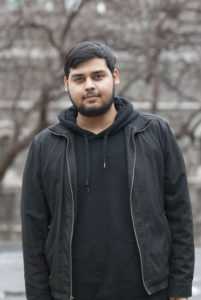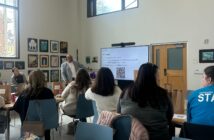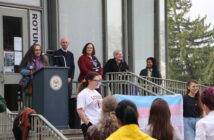
Saad Mansoor
The way I think about the world is different now. My experiences and interactions with people since moving to America have molded me into a different person.
Pakistan is a Muslim country and religion is the most integral component of it. It dominates politics, media and even daily conversations. Like most people in Pakistan, I was brought up in a religious Muslim household and I was taught a set of norms to follow from a young age. Growing up, I was only given the perspective of my religion and, for a very long time, I believed I was blessed to be born in a Muslim family because I was told it was the only way to ascend to heaven. I was also told all non-believers will burn in hell.
Until I was 15 years old, I grew up with a limited view of the world that prevented me from establishing meaningful relationships with different people.
In 2013, my move to a multicultural society in Dubai enabled me to interact with people from different faiths on a daily basis. Those interactions made me question practices I had been taught in the past. It made me realize that every person, religious or not, has desirable attributes, so I started to better appreciate different cultures and rituals.
While Dubai made me more accepting and open-minded as a person, most of the changes in my personality occurred after I moved to the United States.
The time I have spent at Lehigh so far makes me realize that moving to the U.S. to pursue higher education has changed my life for the better.
Ever since I arrived, the majority of the people were much more welcoming and friendly than within the two previous countries I lived in.
Three weeks into freshman year, it all dawned on me.
How can my God be so cruel that all the non-Muslims will burn in hell?
This realization changed how I perceive the world forever.
I started to question everything rigorously. I questioned what it means to be a Muslim in the 21st century, and how society in Pakistan always puts religious interests before anything else — even before the interests of the country. The kind of thought process that exists back home hinders Pakistan from progressing as a country because religion becomes an obstacle in a lot of issues where it has no place.
I feel liberated to be living on a campus where the point of views of people from various ethnicities, cultures, sexual orientations and backgrounds are accepted, and we can all have productive discussions on important issues, even if we disagree with each other.
I have learned so much about myself by talking to people who are drastically different than me. I have come to realize how limited freedom is in my country since old traditions are forced on children from a young age.
If people deviate from religion, society collectively judges and bad-mouths them. Back home, I would feel guilty all the time for not fulfilling every religious requirement expected from me. I consistently thought I wasn’t doing enough to deserve a place in heaven.
My discussions with modern Muslims and people of different faiths have made me accept myself for who I am. They have also changed my beliefs. I no longer believe that my religion is the only way to go to heaven. I no longer feel guilty for not fulfilling every requirement.
My journey of self-exploration has surprised me. I feel like now, I have a closer connection with God than I did in the past, because nothing seems forced. I now consider myself a modern Muslim who accepts people for who they are while still maintaining a connection with my roots.
I am thankful to have had the opportunity to write a column this semester and share my perspective with people from all over the world. The platform provided to me is proof that there is ample opportunity in America to make your voice count without any judgment.
I also know I would have never gotten the opportunity to write articles on such controversial topics back home because society is just too narrow-minded.
I now look back to the confused person I was my first day of Lehigh and realize how much I have grown with immense satisfaction.
So, thank you America!
—
Saad Mansoor, ’20, is an assistant lifestyle editor and columnist for The Brown and White. He can be reached at msm219@lehigh.edu.





Comment policy
Comments posted to The Brown and White website are reviewed by a moderator before being approved. Incendiary speech or harassing language, including comments targeted at individuals, may be deemed unacceptable and not published. Spam and other soliciting will also be declined.
The Brown and White also reserves the right to not publish entirely anonymous comments.
9 Comments
Clearly you have come to America as an immigrant to assimilate into the American culture & you are to be admired for your article & your cultural transition. This is very unlike the illegal immigrants at our southern borders waiving their country flags on top of our border wall & burning American flags once inside our country.
Immigrants to America should be admitted based upon the desire to assimilate & become part of the American culture because they want to become an American citizen vs being a refugee that wants to carry on the culture of their former country.
Bruce, he’s not an immigrant. He’s a student. Our immigration laws refuse him the opportunity to immigrate unless he manages to score a scarce-as-hens’-teeth work visa; recently our govt was talking about refusing those visas altogether to people making less than $100K, which is pretty steep for an entry-level job, even in STEM outside tech, even at PhD level. It’s not unusual for recruiters to spend considerable energy chatting up highly educated, highly accomplished non-nationals only to have to say “sorry, I just don’t think we’d be able to get the visa.”
Your ancestors and mine came here under a much more liberal immigration regime, and would not likely have been admitted to the country under current laws. I don’t know about you, but my parents and I would likely never have been born. A large minority of Lehigh students also have what would today be called refugee ancestors.
As for assimilation: it’s possible to become American without forgetting where you came from. The entire point of a melting pot is that you bring something to add to the pot. The children of the people who never manage to learn English almost always become their parents’ translators: they are the Americans. You should know that by now.
Beautifully written Mr Mansoor. A very good column indeed. And very rightfully pointed out that you’re a better more liberal version of yourself living in a different society all together. In my opinion though religion just makes more sense, when you’re not so focused on the fundamentals/rights-wrongs.
Discussion on a cup of tea is due soon my love
What a wonderful column. You’ve shared a very candid assessment that is unlike anything I’ve heard before. Thank you for sharing your experience with the Lehigh community.
With respect for all others and an openness to the Divine we can all live in a better world. Thanks Saad.
Yes, it is always gratifying to read an article like this.
I do note that commenter Haines makes an assumption which may not be accurate.
I conjecture Saad is most likely here on a student visa.
https://travel.state.gov/content/travel/en/us-visas/study/student-visa.html
Thus, unless he applies for, and receives a different class of visa (no guarantee), he will have to leave the US after he finishes his studies.
Thus, he is not an immigrant in the way one usually thinks about that status.
The realities are that if he goes back to where he came from with the restrictive cultures he described, he will have to be very careful with regards to voicing his new found perspectives on freedom. Otherwise he may be ostracized and could even encounter physical harm.
This is somewhat akin to voicing conservative ideas on many college campuses here in the US.
There is vicious intolerance and lack of First Amendment respect throughout the academy.
Thus the the reason organizations such as The FIRE exist.
https://www.thefire.org/
I note that Lehigh gets an F (red light) rating for its gross lack of tolerance.
Red light apparently based on actions occurring after 9-11 about 17 years ago. At least it seems as though Mr. Mansoor has experienced a more tolerant atmosphere.
Sorry Robert. The Red Light rating has to do with present day polices.
https://www.thefire.org/schools/lehigh-university/
I agree that what occurred 17 years ago by John Smeaton was despicable. The basic problem had to do with Smeaton’s über liberal politically correct mindset.
Unfortunately, Smeaton continued working at Lehigh until recently. He is responsible for Lehigh’s present day restrictive policies.
Smeaton also tried no end of heavy handed failed approaches to handling alcohol and drug issues. These created the mess with the fraternities and sororities that Lehigh is now trying to fix.
Worse yet, even though Smeaton has retired I note he shows up on Lehigh’s organization chart as a special assistant to President Simon.
President Simon would do well to drop Smeaton from that role and see if Ricardo Hall can clean things up.
Thanks. The due process area had other red lights that I apparently skipped over.